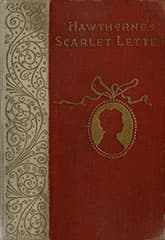The Scarlet Letter
CRITIQUE | THE TEXT
 1892 edition
1892 editionSubtitle
A Romance
First publication
1850
Literary form
Novel
Genre
Literary, historical fiction
Writing language
English
Author's country
United States
Length
Approx. 63,500 words
Notable lines
First lines
Much to the author’s surprise, and (if he may say so without additional offence) considerably to his amusement, he finds that his sketch of official life, introductory to The Scarlet Letter, has created an unprecedented excitement in the respectable community immediately around him. It could hardly have been more violent, indeed, had he burned down the Custom-House, and quenched its last smoking ember in the blood of a certain venerable personage, against whom he is supposed to cherish a peculiar malevolence.
"Preface to Second Edition"
A throng of bearded men, in sad-colored garments, and gray, steeple-crowned hats, intermixed with women, some wearing hoods and others bareheaded, was assembled in front of a wooden edifice, the door of which was heavily timbered with oak, and studded with iron spikes.
"The Prison-Door", Chapter I
Passages
The founders of a new colony, whatever Utopia of human virtue and happiness they might originally project, have invariably recognized it among their earliest practical necessities to allot a portion of the virgin soil as a cemetery, and another portion as the site of a prison.
"My heart was a habitation large enough for many guests, but lonely and chill, and without a household fire."
...she felt or fancied, then, that the scarlet letter had endowed her with a new sense. She shuddered to believe, yet could not help believing, that it gave her a sympathetic knowledge of the hidden sin in other hearts. She was terror-stricken by the revelations that were thus made. What were they? Could they be other than the insidious whispers of the bad angel, who would fain have persuaded the struggling woman, as yet only half his victim, that the outward guise of purity was but a lie, and that, if truth were everywhere to be shown, a scarlet letter would blaze forth on many a bosom besides Hester Prynne’s?
"We men of study, whose heads are in our books, have need to be straitly looked after! We dream in our waking moments, and walk in our sleep."
Let men tremble to win the hand of woman, unless they win along with it the utmost passion of her heart!
No man, for any considerable period, can wear one face to himself, and another to the multitude, without finally getting bewildered as to which may be the true.
It is a curious subject of observation and inquiry, whether hatred and love be not the same thing at bottom. Each, in its utmost development, supposes a high degree of intimacy and heart-knowledge; each renders one individual dependent for the food of his affections and spiritual life upon another; each leaves the passionate lover, or the no less passionate hater, forlorn and desolate by the withdrawal of his subject. Philosophically considered, therefore, the two passions seem essentially the same, except that one happens to be seen in a celestial radiance, and the other in a dusky and lurid glow.
Last lines
Yet one tombstone served for both. All around, there were monuments carved with armorial bearings; and on this simple slab of slate—as the curious investigator may still discern, and perplex himself with the purport—there appeared the semblance of an engraved escutcheon. It bore a device, a herald's wording of which might serve for a motto and brief description of our now concluded legend; so sombre is it, and relieved only by one ever-glowing point of light gloomier than the shadow:—
"On a field, sable, the letter A, gules.".
CRITIQUE | THE TEXT


